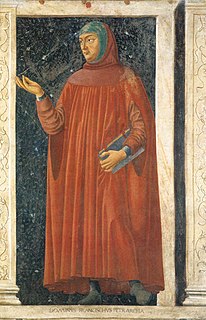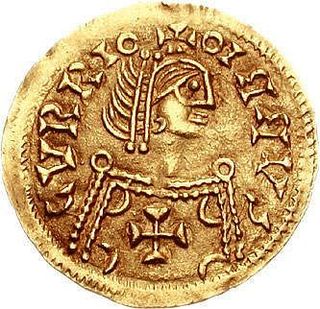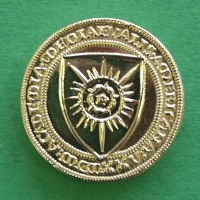Related Research Articles

In the history of Europe, the Middle Ages or medieval period lasted approximately from the 5th to the late 15th centuries, similar to the post-classical period of global history. It began with the fall of the Western Roman Empire and transitioned into the Renaissance and the Age of Discovery. The Middle Ages is the middle period of the three traditional divisions of Western history: classical antiquity, the medieval period, and the modern period. The medieval period is itself subdivided into the Early, High, and Late Middle Ages.

Theodelinda also spelled Theudelinde, was a queen of the Lombards by marriage to two consecutive Lombard rulers, Autari and then Agilulf, and regent of Lombardia during the minority of her son Adaloald, and co-regent when he reached majority, from 616 to 626. For well over thirty years, she exercised influence across the Lombard realm, which comprised most of Italy between the Apennines and the Alps. Born a Frankish Catholic, she convinced her first spouse Autari to convert from pagan beliefs to Christianity.

The "Dark Ages" is a term for the Early Middle Ages, or occasionally the entire Middle Ages, in Western Europe after the fall of the Western Roman Empire that characterises it as marked by economic, intellectual and cultural decline.

Liuvigild, Leuvigild, Leovigild, or Leovigildo, was a Visigothic King of Hispania and Septimania from 568 to April 21, 586. Known for his Codex Revisus or Code of Leovigild, a law allowing equal rights between the Visigothic and Hispano-Roman population, his kingdom covered modern Portugal and most of modern Spain down to Toledo. Liuvigild ranks among the greatest Visigothic kings of the Arian period.

Christopher John "Chris" Wickham, is a British historian and academic. From 2005 to 2016, he was Chichele Professor of Medieval History at the University of Oxford and Fellow of All Souls College, Oxford: he is now emeritus professor. He had previously taught at the University of Birmingham from 1977, rising to be Professor of Early Medieval History from 1997 to 2005.

Framing the Early Middle Ages: Europe and the Mediterranean 400–800 is a 2005 history book by English historian Christopher Wickham at the University of Oxford. It is a broad history of the period between the fall of the Western Roman Empire and the transition to the Middle Ages, often called Late Antiquity.
Henrietta Leyser is an English historian. She is an expert on the history of medieval England, in particular the role of women.
Protofeudalism is a concept in medieval history, especially the history of Spain, according to which the direct precursors of feudalism can be found in Late Antiquity.
Roger J. H. Collins is an English medievalist, currently an honorary fellow in history at the University of Edinburgh.

The Haskins Medal is an annual medal awarded by the Medieval Academy of America. It is awarded for the production of a distinguished book in the field of medieval studies.
Bernard McGinn is an American Roman Catholic theologian, religious historian, and scholar of spirituality. A specialist in Medieval mysticism, McGinn is widely regarded as the preeminent scholar of mysticism in the Western Christian tradition. He is best known for his comprehensive series on mysticism, The Presence of God. According to McGinn, "Even for people who may not have any religious commitment of their own, a study of the great mystics can reveal something about human creativity and genius.",
Hindu scriptures are traditionally classified into two parts: śruti, meaning "what has been heard" and Smriti, meaning "what has been retained or remembered". The Vedas are classified under śruti.

Suintila, or Suinthila, Swinthila, Svinthila; was Visigothic King of Hispania, Septimania and Galicia from 621 to 631. He was a son of Reccared I and his wife Bado, and a brother of the general Geila. Under Suintila there was an unprecedented peace and unity across the Kingdom of the Visigoths. As a direct result, by 624 the king was able to muster the forces necessary to retake those lands that had been under the control of the Eastern Roman Empire.

The Medieval World Series is a history book series published first by Longman and later by Routledge. Works in the series are intended to be an introduction to the authors' specialist subjects and a summing up of the current scholarship and debates of the relevant subjects.
Paul J. Fouracre is professor emeritus of medieval history at the University of Manchester. His research interests relate to early medieval history, the history of the Franks, law and custom in medieval societies, charters, hagiography and serf-lord relations in the eleventh century. His recent work on the cost of the liturgy, focusing on the social and economic effects of providing "eternal light", is a study of the interplay between belief and materiality.
Julia Steuart Barrow, is an English historian and academic, who specialises in medieval and ecclesiastical history. Since 2012, she has been Professor in Medieval Studies at the University of Leeds and previously served (2012–16) as the Director of the University's Institute for Medieval Studies.
The Interlude of the Student and the Girl is one of the earliest known secular plays in English, first performed c. 1300. The text is written in vernacular English, in an East Midlands dialect that suggests either Lincoln or Beverley as its origin, although its title is given in Latin. The name of its playwright is unknown. Only two scenes, with a total of 84 lines of verse in rhyming couplets, are extant and survive in a manuscript held by the British Museum, dated to either the late twelfth or very early thirteenth century. Glynne Wickham provides both the original text and a rendering in modern English in his English Moral Interludes (1976). In tone and form, the interlude seems to be the closest play in English to the contemporaneous French farces, such as The Boy and the Blind Man, and is related to later English farcical plays, such as the anonymous Calisto and Melibea and John Heywood's The Foure PP. It was most likely performed by itinerant players, possibly making use of a performing dog. In Early English Stages (1981), Wickham points to the existence of this play as evidence that the old-fashioned view that comedy began in England with Gammer Gurton's Needle and Ralph Roister Doister in the 1550s is mistaken, ignoring as it does a rich tradition of medieval comic drama. He argues that the play's "command of dramatic action and of comic mood and method is so deft as to make it well-nigh unbelievable" that it was the first of its kind in England.
Isabella Lazzarini is a medieval historian. Her research interests focus on the political, social, and cultural history of late medieval Italy, with an emphasis on Renaissance diplomacy, the growth of different political languages in documentary sources, and - more recently - gender studies.
Barbara Elizabeth Crawford OBE FRSE FSA FSA(Scot) is a British historian. She is a leading authority on the mediaeval history of the Northern Isles of Scotland and Norwegian-Scottish 'frontier' and relations across the North Sea. She is Honorary Reader in Mediaeval History at the University of St Andrews, and Honorary Professor at the University of the Highlands and Islands. She was awarded an OBE for services to History and Archaeology in 2011. She became a Member of the Norwegian Academy in 1997 and was elected a Fellow of the Royal Society of Edinburgh in 2001.
References
- ↑ New Studies in Medieval History. Springer. Retrieved 25 November 2016.
- ↑ Reviewed Work: Early Medieval Spain: Unity in Diversity, 400-1000, (New Studies in Medieval History series) by R. Collins. Review by: P. Fouracre, Teaching History, No. 44 (February 1986), p. 48.
- ↑ "Reviewed Work: Medieval Thought. The Western Intellectual Tradition from Antiquity to the Thirteenth Century by Michael Haren" Review by: Margaret Gibson, The English Historical Review, Vol. 103, No. 406 (Jan., 1988), pp. 165-166.